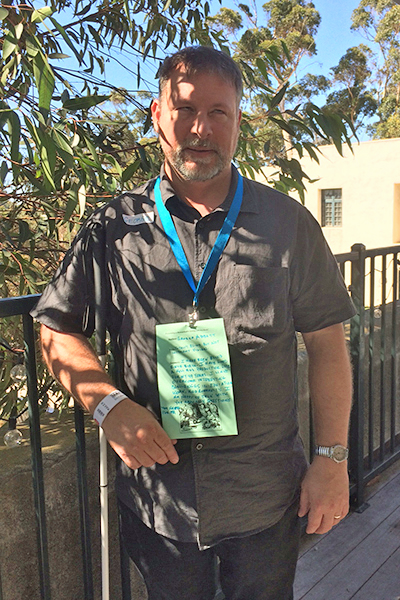Dispelling Misconceptions About Blindness at the 2017 San Diego Maker Faire
October 12, 2017
Kirk Adams and I were pleased to participate in a variety of activities during the 2017 San Diego Maker Faire in Balboa Park, October 7 and 8.
In conjunction with Dr. Melissa Ganus of Quality of Life Experiments, I participated in the Human Library on October 7 at the San Diego Museum of Man. Several individuals representing a variety of communities were brought together to serve as living books to be checked out. The concept was to provide a nonthreatening environment in which people could approach and talk with individuals with disabilities, cancer, and mental illness, among other people, in a way that would not seem appropriate among strangers on the street. One goal was to provide an opportunity to have a dialogue and learn about the experiences of those who seem to live "differently" than most people to gain a better understanding and to ultimately lead to greater inclusion, less stigma, and to dispel myths and misconceptions.
Each volunteer book wore a lanyard around his or her neck to which a sheet of paper was clipped giving a brief title and short description of what he or she was available to talk about. Think of this as a book jacket. When I was first checked out for a discussion I joked that I felt a little like the Little Puppy in the Window being adopted.
I had very interesting discussions with those who chose to invite me to talk with them. On one occasion I was invited to speak with a mother and her fifteen-year-old daughter and on another a mother and her eight-year-old son. In both cases, the parent initiated the questions and the children sat by silently, but before long, they jumped in with questions of their own. On another occasion, two twelve-year-old boys asked to speak with me. Of the dozen or more people I spoke with, I was asked a variety of questions. Here are some of them, along with the responses I gave.
Q: What was the cause of my blindness, when did I become blind and what can I see?
A: I was born blind. My optic nerves did not fully develop. I am able to detect daylight or intensely bright lights up close, but little else. I explain that my eyes move involuntarily due to a condition called nystagmus.
Q: What do colors mean to me?
A: I am not terribly interested in colors for colors' sake, but I have learned the meaning of colors as they relate to me and my environment. For example, knowing what color shirts go best with gray pants, versus brown is important and affects my appearance and people's perception of me as a professional. Healthy grass is green and a clear sky is blue. I learn to attach meaning to colors from descriptions I read in books, what I hear in movies and from talking with friends and family.
Q: What do I wish I could see or have sight to do?
A: Generally speaking, I do not feel like I am missing out on anything in my life due to being blind since birth. If I could see to drive, that would be a benefit; however, I have been fortunate enough to have chosen to live in an area with excellent transportation options and the businesses and services I rely upon most are within walking distance (grocery, convenience, and hardware stores; bank and ATM; dry cleaner; restaurants; movie theater; athletic club). I would be interested to see the grandeur of the Rocky Mountains and experience the Northern Lights and a starry sky. I would like to see my daughter, wife, and loved ones, but again, I do not believe it is necessary to see people to fully appreciate them.
Q: Did I ever feel sorry for myself or despise my blindness?
A: For the most part, I have not felt as if I was less of a person or felt sorry for myself because of being blind. I did, however, have a difficult time around age 16. This was the time my friends were getting their driver's licenses, which brought about a new level of freedom and independence for them that I could not experience. They were also getting their first part-time jobs, which meant they had money to buy clothes, concert tickets and so on. Having an income afforded opportunities for control over what they possessed and experienced. Lastly, dating seemed to be more challenging for me than any of my friends during this time.
Q: Was it hard to date?
A: In short, I would say yes. I think this has a lot to do with how we make our most intimate connections through our eyes and place great value on facial expressions. I do not have the ability to look into someone's eyes and I think that can be uncomfortable and even confusing for some people. Also, many people have the perception that I cannot be an equal partner in parenting or contributing income to the household. Some people believe that I need to be taken care of rather than realizing that I am an adult with all of the responsibilities that entails.
People have actually said to me that because I am blind and know what it feels like to be discriminated against or excluded, I must be very accepting and receptive to dating anyone. This could not be farther from the truth. I find certain personalities, body types, and other characteristics more attractive than others. I have preferences and dislikes, just like everyone else.
